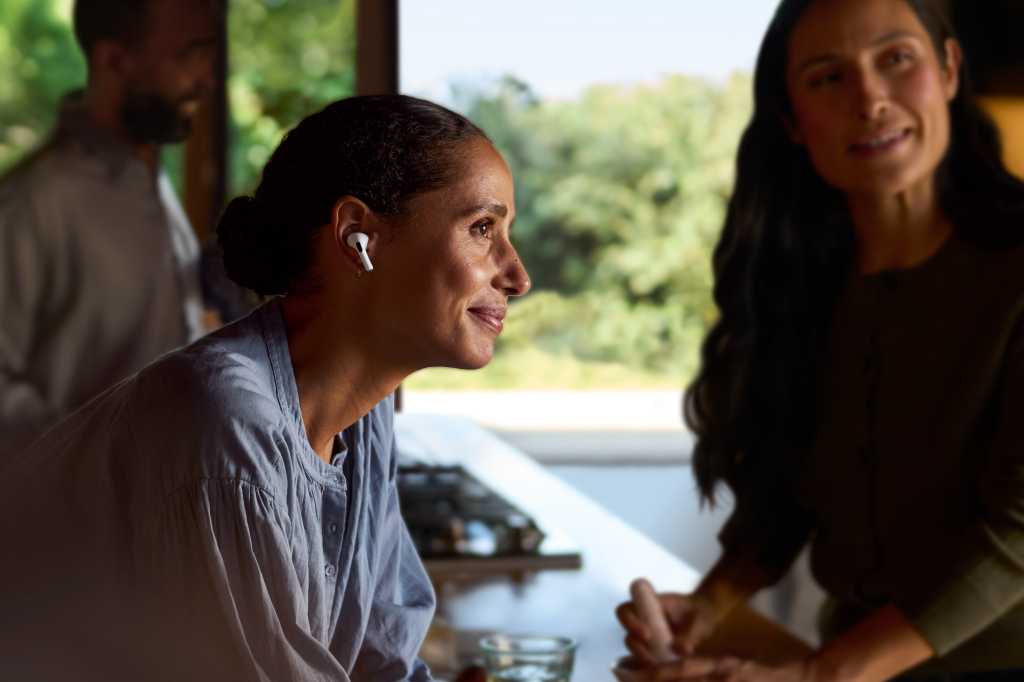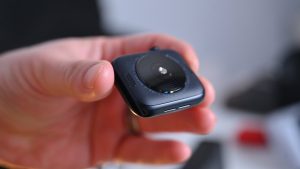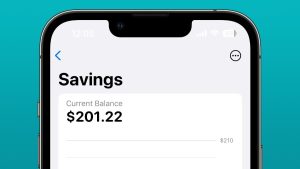
Much has been said about Apple’s ecosystem and how it’s engineered so that it makes it difficult to leave it. Why would you? It’s so easy to switch between your iPhone, iPad, and Mac regardless of the work you are doing–or the fun you are having. AirPods have always been included in the ecosystem, but after the Glowtime event, it’s clear that Apple is making a concerted effort to keep AirPods in your ears, so much so that you’ll put them on and will have few reasons to take them off.
Now hear this
The most obvious new always-on feature is the AirPods Pro’s new hearing health awareness. The first key feature is Hearing Protection, which was designed to protect you from loud environmental noises. It “translates the sound signatures of what you hear to lower levels in environments as loud as 110 dBA.” It also “actively reduces louder, more intermittent noise at 48,000 times per second.” It’s on by default, in an effort to be proactive about protecting your hearing. (This feature will initially be available in the U.S. and Canada only.)
The other key feature is the “clinical-grade Hearing Aid” that can be programmed after taking a five-minute scientifically validated hearing test. The test results indicate how much hearing loss you might have, and a custom profile of your hearing is made for setting up the main new feature, Hearing Aid. If the hearing test indicates you have mild to moderate hearing loss, a personalized hearing profile will guide you to set up your AirPods to function as a hearing aid, which boosts frequencies so sounds are clearer and uses machine learning to make real-time adjustments.
Obviously, hearing aids are designed to be worn all day, but most people don’t get one until they have to. Apple’s hearing features are designed to amplify your hearing before it becomes dire and protect your hearing from dangerously loud noises. And best of all? They’re completely free for AirPods Pods 2 users. Hearing aids can cost thousands of dollars per pair—and they generally don’t stream music from your phone.
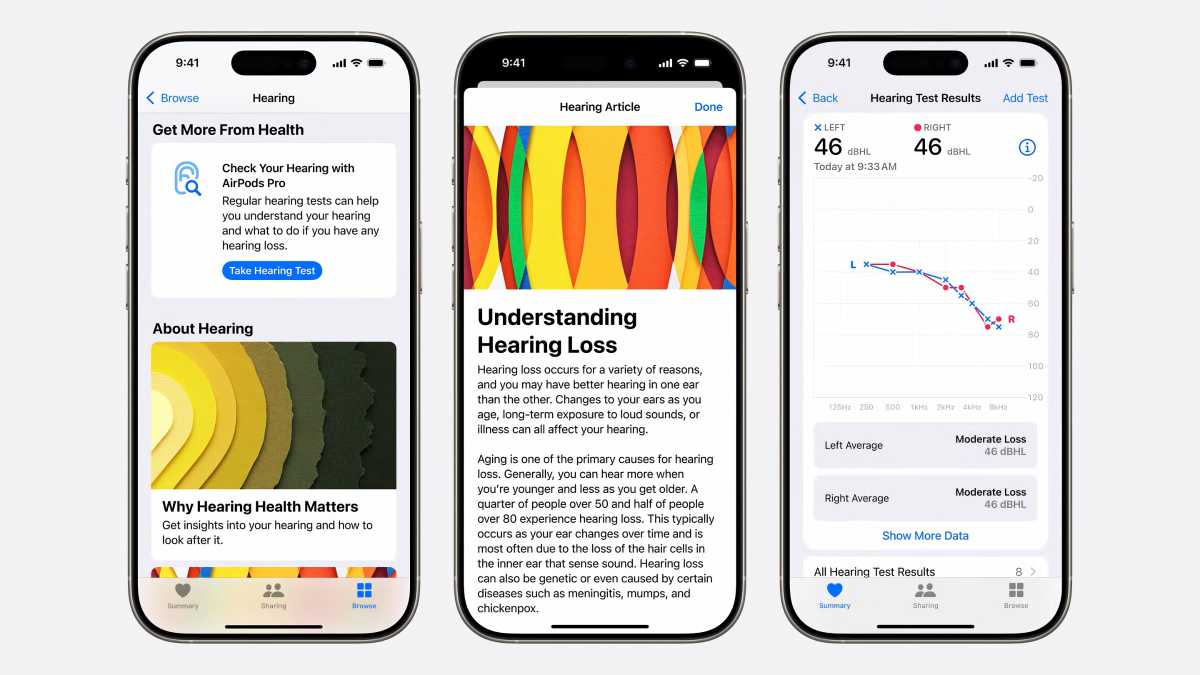
With the Hearing Test, Apple is promoting the AirPods as a device to help maintain proper health.

With the Hearing Test, Apple is promoting the AirPods as a device to help maintain proper health.
Apple

With the Hearing Test, Apple is promoting the AirPods as a device to help maintain proper health.
Apple
Apple
Apple groups the Hearing Protecting, Hearing Test, and Hearing Aid features together, but the AirPods Pro 2 has more features that adjust to what need to listen to, so you don’t have to take them off. There’s Adaptive Noise Control, which blends Active Noise Cancellation and Transparency mode to adjust the level of noise control based on your surroundings, while Conversation Boost and Conversation Awareness make the voices of people speaking to you clearer.
Then there’s the stuff that makes the listening experience better, like Adaptive EQ, Active Noise Cancelation, and the feature that plays calming background sounds to mask noise. It’s all meant to enhance not just the Apple ecosystem but also our own environment through our ears—and not just when listening to music.
Listen up
Some might say that at $249 for the AirPods Pro 2, “You’re dang right I’m never taking these things off!” But even at the $179 level, Apple has improved the AirPods 4 so you’ll be more tempted to leave them on too. It now has features that were previously reserved for the AirPods Pro: Active Noise Cancelation, Transparency Mode, and Conversation Awareness. If you don’t need the hearing aid features just yet, the AirPods 4 are a good and more affordable alternative.
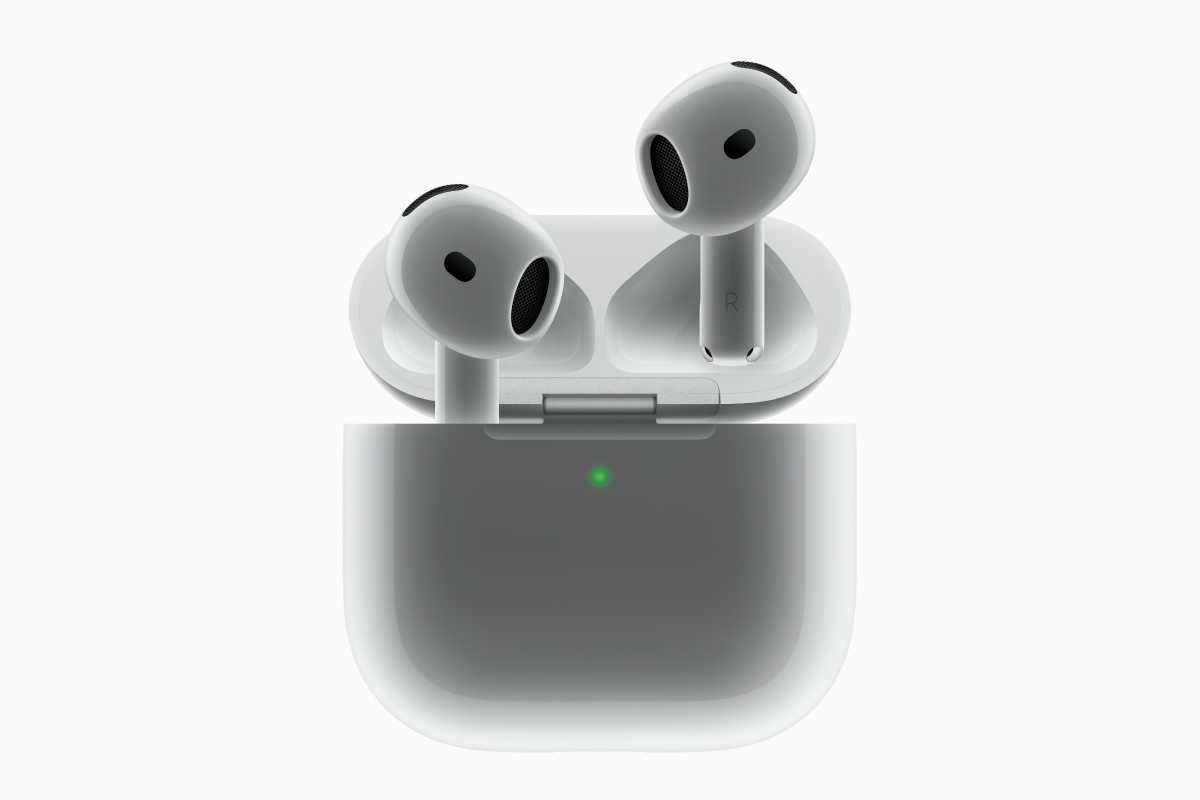
The $179 AirPods 4 now have Active Noise Cancelation, which makes them an attractive alternative to the AirPods Pro 2.

The $179 AirPods 4 now have Active Noise Cancelation, which makes them an attractive alternative to the AirPods Pro 2.
Apple

The $179 AirPods 4 now have Active Noise Cancelation, which makes them an attractive alternative to the AirPods Pro 2.
Apple
Apple
Because Apple has engineered the AirPods to automatically switch between your iPhone, iPad, and Mac, you can use one set for every device–you never have to take them off or even turn them off when you switch from your car to your desk. Sure, you might need to take them off in some circumstances, like if you’re editing audio and using high-impedance headphones. But for most of the time, you can use the AirPods.
Ear to the ground
Rumors have swirled for years that hearing isn’t the only health feature Apple is looking to add to AirPods. Among the rumors are a possible temperature sensor and heart-rate sensor—which Apple is likely bringing to Power Beats Pro 2. It’s not crazy to imagine a future update bringing sleep mode to AirPods that automatically blocks noise, plays white noise, and measures your sleep stages.
And there’s Vision Pro as well. While Apple’s headset has built-in speakers, it’s a markedly better experience when paired with AirPods, particularly AirPods Pro 2, which have lossless audio. And as Vision Pro shrinks down to the size of a pair of glasses, AirPods will be right there as a must-have accessory.
Apple’s AirPods are already everywhere and their design makes them instantly recognizable. But Apple is starting to unleash the AirPods’ potential as a device that can contribute to a healthy lifestyle, productivity, and fun. With each improvement, AirPods become more vital to your experience, giving you fewer reasons to ever take them off.
Learn more about Apple’s new AirPods.
Apple AirPods Pro (2nd-gen, 2023, USB-C)
Price When Reviewed: $249
Apple AirPods 4 (with ANC)
Price When Reviewed: $179 with Sctive Noice Cancelation
Apple AirPods 4 (without ANC)
Price When Reviewed: $129 without Active Noise Cancelation

